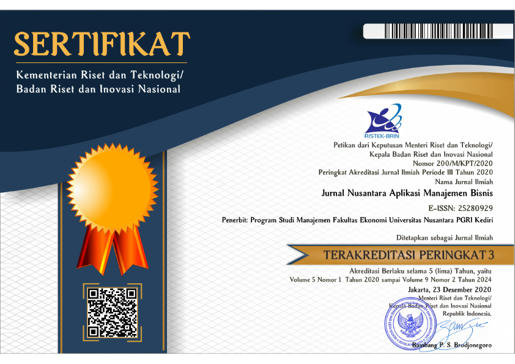Hard Skill Sebagai Faktor Dominan Kesiapan Kerja Di Era Industri 4.0
DOI:
https://doi.org/10.29407/nusamba.v8i1.18676Keywords:
soft skill, hard skill, kompetensi, kesiapan remaja, era industri 4.0, generasi zAbstract
Research aim :
This study aims to test soft skills and hard skills and competencies to determine job readiness in the industrial era 4.0 in generation z students at public and private universities in the city of Semarang.
Design/Methode/Approach :
The sample technique used was proportional random sampling. Data collected using a survey method using a questionnaire. This study uses Structural Equation Modeling (SEM) data analysis techniques which are operated using the AMOS 24 program.
Research Finding :
Hard Skills have a direct effect on Work Readiness in the industrial era 4.0. 2) Soft Skills have a direct effect on Work Readiness in the industrial era 4.0. 3) Hard Skills have no effect on Work Readiness in the industrial era 4.0 through Competence as a mediating variable. 4) Soft Skills have an indirect effect on work readiness in the industrial era 4.0 through competence as a mediating variable.
Theoretical contribution/Originality :
Generation Z students can be well received in the world of work, and are able to succeed in the world of work, apart from the hard skills they have, of course from the soft skills they have.
Practitionel/Policy implication :
The practical implications of this research have the potential to prove that high curiosity in seeking knowledge, experience and enthusiasm is important to compete in preparing to work in the industrial era 4.0.
Research limitation :
This research was only conducted by students in the city of Semarang and research is still limited to a short time or data using cross-sectional data.
Downloads
References
A. M. Rahmat, A. Haimi, M. Adnan, and N. Marini, “Industry 4 . 0 Skillsets and ‘ Career Readiness ’: Can Malaysian University Students face the Future of Work ?,” Proc. Int. Invent. Innov. Creat. Conf., no. November, 2019.
W. Teng, C. Ma, S. Pahlevansharif, J. J. Turner, S. Pahlevansharif, and J. J. Turner, “Graduate readiness for the employment market of the 4th industrial revolution The development of soft employability skills,” 2019, doi: 10.1108/ET-07-2018-0154.
S. P. Low, S. Gao, and E. W. L. Ng, “Future-ready project and facility management graduates in Transforming mindsets and competencies,” 2019, doi: 10.1108/ECAM-08-2018-0322.
A. Bencsik and T. Juhasz, “Y and Z Generations at Workplaces,” J. Compet., vol. 6, no. 3, pp. 90–106, 2016, doi: 10.7441/joc.2016.03.06.
E. Goh and C. Lee, “A workforce to be reckoned with: The emerging pivotal Generation Z hospitality workforce,” Int. J. Hosp. Manag., vol. 73, no. January, pp. 20–28, 2018, doi: 10.1016/j.ijhm.2018.01.016.
R. Panjaitan, “Keterlibatan Manajemen Pengetahuan dan Manajemen Bakat Pada Kinerja Karyawan di PT Ditoeku,” Jesya (Jurnal Ekon. Ekon. Syariah), vol. 4, no. 2, pp. 1021–1033, 2021, doi: 10.36778/jesya.v4i2.385.
G. Prawitasari, “The Influence of Generations on Career Choice (Social Cognitive Career Theory Perspective),” Konselor, vol. 7, no. 1, pp. 15–20, 2018, doi: 10.24036/02018718464-0-00.
P. Verma, A. Nankervis, S. Priyono, M. N. Saleh, J. Burgess, and J. Connell, “Equality , Diversity and Inclusion : An International Journal Article information :,” Equal. Divers. Incl. An Int. J., 2017.
K. Benati and J. Fischer, “Beyond human capital : student preparation for graduate life,” 2019, doi: 10.1108/ET-10-2019-0244.
I. Supriadi, A. Hariyanti, M. Z. Abidin, Rinrin, and D. Gustian, “Penerapan regresi linier berganda dalam kesiapan kerja mahasiswa,” Semin. Nas. Inform. 2020, vol. 1, no. 1, pp. 204–211, 2020.
M. Chavan and L. Carter, “Management students – expectations and perceptions on work readiness,” Int. J. Educ. Manag., vol. 32, no. 5, pp. 825–850, 2018, doi: 10.1108/IJEM-10-2016-0219.
S. M. Setiana, L. Setiawati, and M. Mustaqim, “Hard skills versus soft skills: How do they affect different job types of Japanese language graduates?,” Int. J. Learn. Teach. Educ. Res., vol. 18, no. 11, pp. 176–192, 2019, doi: 10.26803/ijlter.18.11.10.
A. R. Fahmi, E. Hadiyati, and , A., “Pengaruh Knowledge Dan Skill Terhadap Kinerja Melalui Kompetensi Kewirausahaan Pada Pengusaha Ukm Produk Unggulan Kota Malang,” Reformasi, vol. 10, no. 1, pp. 1–10, 2020, doi: 10.33366/rfr.v10i1.1596.
T. S. Wibowo et al., “Effect of Hard Skills, Soft Skills, Organizational Learning and Innovation Capability on Islamic University Lecturers’ Performance,” Syst. Rev. Pharm., vol. 11, no. 7, pp. 556–569, 2020, doi: 10.31838/srp.2020.7.80.
J. E. Montandon, C. Politowski, L. L. Silva, M. T. Valente, F. Petrillo, and Y. G. Guéhéneuc, “What skills do IT companies look for in new developers? A study with Stack Overflow jobs,” Inf. Softw. Technol., vol. 129, pp. 1–6, 2021, doi: 10.1016/j.infsof.2020.106429.
E. Yanthy, R. N. Sudiyono, H. Waruwu, E. Agistiawati, and A. Purwanto, “Pengaruh Soft Skills Dan Hard Skill Terhadap Inovasi Guru Sekolah Islam,” Refletika Educ., vol. 10, no. 2, pp. 365–383, 2020.
W. Cahyadiana, “Pengaruh Hard Skill Dan Soft Skill Terhadap Self Efficacy Mahasiswa,” Psikovidya, vol. 24, no. 1, pp. 1–7, 2020, doi: 10.37303/psikovidya.v24i1.139.
G. B. Cotet, B. A. Balgiu, and V. C. Zaleschi, “Assessment procedure for requested by Industry 4 . 0 the soft skills,” vol. 07005, pp. 1–8, 2017, doi: 10.1051/matecconf/20171210 7005.
O. E. Abdul, “Entrepreneurial skills and growth of Small and Medium Enterprise (SMEs): A comparative analysis of Nigerian entrepreneurs and Minority entrepreneurs in the UK,” Int. J. Acad. Res. Bus. Soc. Sci., vol. 8, no. 5, 2018, doi: 10.6007/ijarbss/v8-i5/4083.
R. K. Lubis, “The Effect Of Soft Skill On Work Readiness Facing Society 5 . 0 In Informatics Engineering Students Of STMIK Pelita Nusantara Medan,” J. Manag. Sci., vol. 4, no. 1, pp. 13–16, 2021.
Z. Rasid, B. Tewal, and C. Kojo, “Pengaruh Hard Skill Dan Soft Skill Terhadap Kinerja Karyawan Perum Damri Manado,” J. EMBA J. Ris. Ekon. Manajemen, Bisnis dan Akunt., vol. 6, no. 2, pp. 1008–1017, 2018, doi: 10.35794/emba.v6i2.20030.
S. Siddique, A. Ahsan, N. Azizi, and O. Haass, “Students’ Workplace Readiness: Assessment and Skill-Building for Graduate Employability,” Sustain., vol. 14, no. 3, pp. 1–15, 2022, doi: 10.3390/su14031749.
T. A. Santoso and D. A. Sudjimat, “Hubungan Soft Skills dan Prestasi Praktik Industri dengan Kesiapan Siswa Memasuki Dunia Kerja,” J. Teknol. Kejuruan, dan Pengajarnya, vol. 42, no. 2, pp. 148–157, 2019.
E. Y. Muspah, A. Gani, and Ramlawati, “Pengaruh Hard Skill dan Soft Skill Terhadap Kinerja Pegawai pada Kantor Camat Galesong Utara di Kabupaten Takalar,” Ilmu Ekon., vol. 4, no. 1, pp. 131–142, 2021.
I. Wings, R. Nanda, and K. J. Adebayo, “A Context-Aware Approach for Extracting Hard and Soft Skills,” Procedia Comput. Sci., vol. 193, pp. 163–172, 2021, doi: 10.1016/j.procs.2021.10.016.
D. Setiawati and Mayasari, “soft skill . Soft skill,” Scioentific Journals Econ. Educ., vol. 5, no. 1, pp. 1–42, 2021.
C. Eliyani, Yanto, and S. Sunarto, “Determinan Kesiapan Kerja Siswa SMK Kelas XII Kompetensi Keahlian Akuntansi di Kota Semarang,” J. Econ. Educ., vol. 5, no. 1, pp. 22–30, 2016.
L. H. Mardyasari and Indiarto, “MODEL PENGUATAN KESIAPAN KERJA LULUSAN (Studi Pada BBPLK Semarang),” pp. 148–162, 2017.
U. Pangastuti and M. Khafid, “Peran Kematangan Karir dalam Me-mediasi Kompetensi Kejuruan dan Efikasi Diri terhadap Kesiapan Kerja Siswa,” Econ. Educ. Anal. J., vol. 8, no. 2, pp. 485–500, 2019, doi: 10.15294/eeaj.v8i2.31496.
R. M. Sriram and S. Vinodh, “Analysis of readiness factors for Industry 4.0 implementation in SMEs using COPRAS,” Int. J. Qual. Reliab. Manag., vol. 38, no. 5, pp. 1178–1192, 2021, doi: 10.1108/IJQRM-04-2020-0121.
A. Purwanto, M. Asbari, and T. I. Santoso, “INTERNATIONAL JOURNAL OF SOCIAL AND MANAGEMENT STUDIES (IJOSMAS) Analisis Data Penelitian Sosial dan Manajemen: Perbandingan Hasil antara Amos, SmartPLS, WarpPLS, dan SPSS Untuk Jumlah Sampel Medium,” no. 04, pp. 43–53, 2021.
Y. Fan et al., “Applications of structural equation modeling (SEM) in ecological studies: an updated review,” Ecol. Process., vol. 5, no. 1, 2016, doi: 10.1186/s13717-016-0063-3.
A. Al Mamun, S. A. Fazal, and R. Muniady, “Entrepreneurial knowledge, skills, competencies and performance,” Asia Pacific J. Innov. Entrep., vol. 13, no. 1, pp. 29–48, 2019, doi: 10.1108/apjie-11-2018-0067.
A. R. Fahmi, E. Hadiyati, and Ahmad, “Pengaruh Knowledge Dan Skill Terhadap Kinerja Melalui Kompetensi Kewirausahaan Pada Pengusaha Ukm Produk Unggulan Kota Malang,” Reformasi, vol. 10, no. 1, pp. 1–10, 2020, doi: 10.33366/rfr.v10i1.1596.
A. P. Lista, G. L. Tortorella, M. Bouzon, M. Thürer, and D. Jurburg, “Soft and hard skills development in lean management trainings,” Int. J. Lean Six Sigma, 2022, doi: 10.1108/IJLSS-06-2021-0116.
A. Ariyanto, A. Wahyudin, and S. Martono, “The Effect of Soft Skills t o Student ’ s Work Readiness Through Learning Achievements and on the Job Training as Interviening Variable ( Empirical Studies on Accounting Major of Vocational High School Students in Tegal Regency ),” J. Econ. Educ., vol. 9, no. 1, pp. 73–79, 2020.
M. S. Rao, “Soft skills: toward a sanctimonious discipline,” Horiz., vol. 26, no. 3, pp. 215–224, 2018, doi: 10.1108/OTH-06-2017-0034.
T. C. Mims, K. Thompson, R. Conde, and M. Gade, “An Immersion Approach to Client-Sponsored Projects: Preparing Students with Soft Skills Required for Hiring - Face to Face & Virtual Methods,” Int. J. High. Educ., vol. 10, no. 2, p. 42, 2020, doi: 10.5430/ijhe.v10n2p42.
A. G. Kyrousi, E. Tzoumaka, and S. Leivadi, “Business employability for late millennials: exploring the perceptions of generation Z students and generation X faculty,” Manag. Res. Rev., vol. 45, no. 5, pp. 664–683, 2022, doi: 10.1108/MRR-04-2021-0328.
T. E. Marshall, D. Drum, S. Morris, and S. L. Lambert, “Leveraging research within a pedagogical protocol for enhanced integrated-competency student learning,” J. Account. Educ., vol. 56, p. 100741, 2021, doi: 10.1016/j.jaccedu.2021.100741.
R. Ferreras-Garcia, J. Sales-Zaguirre, and E. Serradell-López, “Developing entrepreneurial competencies in higher education: a structural model approach,” Educ. Train., vol. 63, no. 5, pp. 720–743, 2021, doi: 10.1108/ET-09-2020-0257.
N. L. C. Lie and N. K. Darmassetiawan, “Pengaruh Soft Skill Terhadap Kesiapan Kerja Menghadapi Masyarakat Ekonomi ASEAN pada Mahasiswa S1 Fakultas Bisnis dan Ekonomika Universitas Surabaya,” J. Ilm. Mhs. Univ. Surabaya, vol. 6, no. 2, p. 19, 2017.
Downloads
Published
Issue
Section
License
Authors who publish with this journal agree to the following terms:
- Copyright on any article is retained by the author(s).
- The author grants the journal, the right of first publication with the work simultaneously licensed under a Creative Commons Attribution License that allows others to share the work with an acknowledgment of the work’s authorship and initial publication in this journal.
- Authors are able to enter into separate, additional contractual arrangements for the non-exclusive distribution of the journal’s published version of the work (e.g., post it to an institutional repository or publish it in a book), with an acknowledgment of its initial publication in this journal.
- Authors are permitted and encouraged to post their work online (e.g., in institutional repositories or on their website) prior to and during the submission process, as it can lead to productive exchanges, as well as earlier and greater citation of published work.
- The article and any associated published material is distributed under the Creative Commons Attribution-ShareAlike 4.0 International License












